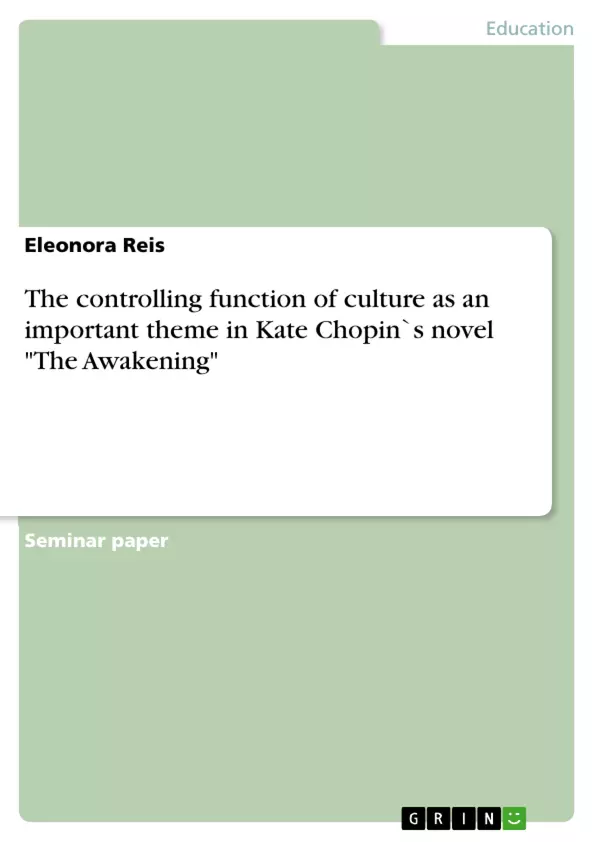In his essay “Culture”, Steven Greenblatt makes the assertion that culture functions “as a pervasive technology of control, a set of limits within which social behaviour must be contained” (Greenblatt 225). This controlling function of culture is a central issue in Kate Chopin`s novel “The Awakening”. In the following essay I will prove that cultural boundaries and social conventions play a very important role in “The Awakening”. By means of two specific examples from the text, I will show that Greenblatt`s thesis corresponds to the function of culture at the time in which the novel takes place.
Table of Contents
- Abandoning the Reception Day
- Moving out alone into a new home
Objectives and Key Themes
This essay aims to demonstrate the controlling function of culture in Kate Chopin's "The Awakening," as articulated by Steven Greenblatt. It will analyze how cultural boundaries and social conventions significantly impact the protagonist's actions and their consequences.
- The controlling nature of 19th-century societal norms on women.
- The economic implications of conforming to (or rejecting) cultural expectations.
- Edna Pontellier's defiance of societal expectations and its repercussions.
- The separation of masculine and feminine spheres in the late 19th century.
- The consequences of exceeding societal limitations.
Chapter Summaries
Abandoning the Reception Day: This section analyzes Edna Pontellier's deliberate disregard for the societal expectation of attending Reception Days, a crucial social event for maintaining a middle-class wife's status and her husband's business connections. Edna's absence is viewed as a transgression against social decorum and an economic risk to her husband, Leonce, as the guests held significance for his business dealings. Leonce's anger focuses primarily on the potential financial damage to his reputation and social standing, highlighting the economic and social constraints imposed by the cultural norms of the time. This emphasizes the controlling aspect of culture, as failure to conform results in tangible economic and social consequences.
Moving out alone into a new home: This section explores Edna's decision to move out of the family home, a drastic act that further challenges the cultural expectations of women in the late 19th century. Society viewed a woman's place as being within the domestic sphere, intimately tied to her husband and family. Edna’s action is viewed as scandalous, eliciting concern from Leonce, not necessarily about their marital relationship, but predominantly about the perception of their financial status and his business reputation. Leonce's actions to maintain appearances—renovating the house and fabricating a story about a sojourn abroad—underscore the overwhelming pressure to conform and avoid social ostracism. The chapter reinforces the idea of culture as a technology of control, punishing those who stray from societal norms with social and economic repercussions. Edna's desire for independence clashes directly with the ownership structure of the time, where wives and possessions were legally considered the husband's property. Her move represents a rejection of this ownership and a desire for autonomy, actions that are inherently transgressive within the societal context.
Keywords
Culture, social conventions, societal norms, economic consequences, gender roles, 19th-century America, Kate Chopin, The Awakening, feminine passivity, social control, Edna Pontellier, domestic sphere, public sphere.
Kate Chopin's "The Awakening": A Comprehensive Language Preview - FAQ
What is the purpose of this language preview?
This preview provides a comprehensive overview of a text analyzing Kate Chopin's "The Awakening," focusing on the controlling function of culture. It includes the table of contents, objectives and key themes, chapter summaries, and keywords.
What are the key themes explored in the analysis of "The Awakening"?
The analysis explores the controlling nature of 19th-century societal norms on women, the economic implications of conforming to (or rejecting) cultural expectations, Edna Pontellier's defiance of societal expectations and its repercussions, the separation of masculine and feminine spheres, and the consequences of exceeding societal limitations.
What are the main chapters covered in the preview?
The preview summarizes two key chapters: "Abandoning the Reception Day" and "Moving out alone into a new home."
What is discussed in the "Abandoning the Reception Day" chapter summary?
This section analyzes Edna Pontellier's refusal to attend a social event, highlighting the economic and social consequences of her transgression against social decorum. It emphasizes how her actions risk her husband's business reputation and underscores the controlling aspect of culture through tangible repercussions.
What is discussed in the "Moving out alone into a new home" chapter summary?
This section examines Edna's decision to leave her family home, challenging the societal expectations of women in the late 19th century. It shows how her action is viewed as scandalous and the lengths her husband goes to maintain appearances, reinforcing the idea of culture as a technology of control. Edna's move represents a rejection of societal ownership structures and a desire for autonomy.
What are the key words associated with this analysis of "The Awakening"?
Key words include: Culture, social conventions, societal norms, economic consequences, gender roles, 19th-century America, Kate Chopin, The Awakening, feminine passivity, social control, Edna Pontellier, domestic sphere, public sphere.
What is the overall objective of the analysis?
The essay aims to demonstrate the controlling function of culture in Kate Chopin's "The Awakening," as articulated by Steven Greenblatt, by analyzing how cultural boundaries and social conventions impact the protagonist's actions and their consequences.
What is the scope of the analysis?
The analysis focuses on how cultural norms and expectations in 19th-century America constrained women and the repercussions faced by those who challenged these constraints, using Edna Pontellier's actions as a case study.
- Arbeit zitieren
- Eleonora Reis (Autor:in), 2006, The controlling function of culture as an important theme in Kate Chopin`s novel "The Awakening" , München, GRIN Verlag, https://www.hausarbeiten.de/document/125888


